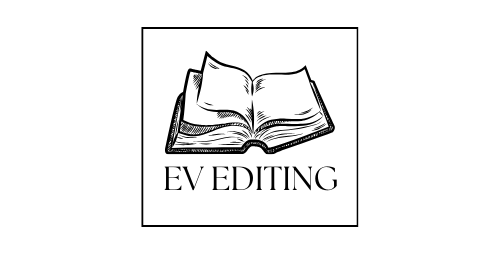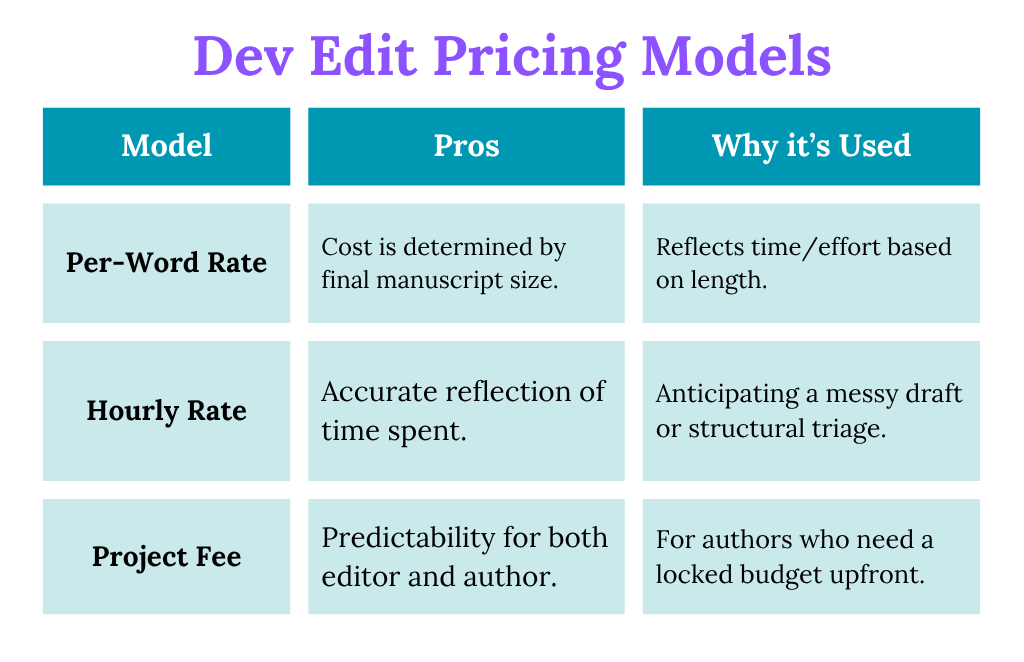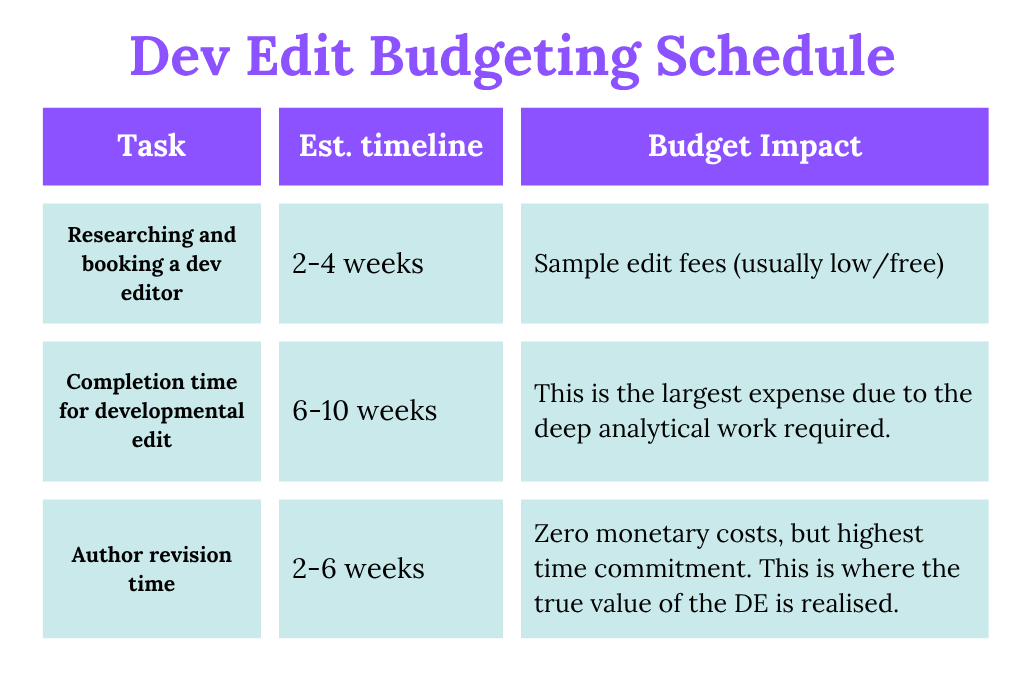The True Cost of Developmental Editing: Rates and Budgeting Guide
The moment a self-published author decides to invest in professional editing, a single question lingers in their mind: “How much is this going to cost?” This question is particularly complicated for speculative fiction authors due to the complex worldbuilding and magic systems typical of your genre.
Viewing developmental editing (DE) as a non-negotiable investment, rather than an optional expense, transforms your entire self-publishing strategy. After all, you’re purchasing security and confidence that the ideas in your head translate to paper.
This article covers:
Developmental Editing Rates Breakdown
Why You Need to Budget for a Developmental Editor
The Author’s Budgeting Timeline: How to Plan for a Developmental Edit
4 Actionable Budgeting Tips for Self-Published Authors
Let’s deconstruct the cost of developmental editing and discuss best practices for hiring a DE specialist.
Developmental Editing Rates Breakdown
Developmental editors price their rates separately from copy editing and proofreading. The cost of a developmental edit is generally determined by one of three common models:
Per-word rate: Some developmental editors charge a rate per word, reflecting the amount of time and effort the manuscript requires.
Hourly rate: Other editors charge an hourly rate, which is common when the editor anticipates a difficult or messy first draft requiring structural triage before the full analysis can begin.
Project rate (fixed fee): Professionals might offer a fixed fee based on factors like the length and complexity of the project. This approach offers predictability for the author but requires a thorough assessment (usually a sample edit) beforehand to ensure both parties agree on the scope.
Why You Need to Budget for Developmental Editing
Guaranteed Structural Security and Reader Loyalty
A developmental editor verifies whether your plot holds together and your readers stay hooked from the first page to the last. This structural integrity is what generates five-star reviews and converts first-time readers into lifelong fans, leading directly to higher sales for your subsequent books.
Maximising Your Overall Editing Budget
As we’ve explored, your editing budget is often split between developmental editing, copy editing and proofreading. Ultimately, a high-quality developmental edit is the most effective way to save money on the later editing stages. You’re getting off on the right foot by ensuring all major structural issues are resolved before you hire a copy editor, so you avoid the costly mistake of paying to refine prose that will be deleted or rewritten later.
Unlock Your Genre Potential
Speculative fiction writers have added challenges: Are your magic systems consistent? Will readers be able to understand your worldbuilding? By choosing a speculative fiction specialist, you can feel confident that you’re receiving a comprehensive analysis of the unique, complex logic you’ve created.
The Author’s Budgeting Timeline: How to Plan for a Developmental Edit
There are a few stages of the editing process you should know about. This suggested schedule maximises quality while protecting your finances.
Phase 1: Developmental Editing (The Foundational Investment)
This phase is where the most valuable structural work happens.
Research & Booking: Allow 2–4 weeks to find a genre specialist, read samples, and sign a contract. The budget impact here is generally low, and sample edits are usually free.
Developmental Edit: The editor's work takes 6–12 weeks. This is your highest-cost investment because the work is analytical and requires genre-specific expertise.
Author Revisions: You will need 4–8 weeks after receiving the DE report to implement the feedback. This stage has zero monetary cost but requires your highest time commitment; it’s where the true value of the DE is realised.
Phase 2: Copy Editing (Prose Polish)
This stage begins only after you have fully implemented the structural revisions from the DE.
Copy Editing: The editor's work takes 3–6 weeks. The cost is mid-range.
Author Review: Schedule 1–2 weeks to review the editor's changes and accept/reject them, locking down the final prose.
Phase 3: Proofreading (The Final Safety Net)
Proofreading is the final quality check, performed on the freshly edited manuscript.
Formatting & Design: Allow 2–4 weeks for the manuscript to be professionally formatted for print and e-book. The cost here varies depending on your designer.
Proofreading (PF): The editor's work takes 1–2 weeks. This investment reflects the limited scope of checking for residual typos and layout errors.
4 Actionable Budgeting Tips for Self-Published Authors
Let’s look at some tips to ensure you are financially prepared to give your book the edit it deserves.
Request a Sample Edit
Developmental editors sometimes offer to complete a sample edit, which is an edit conducted on a 1-2k-word sample of your novel. The goal of a sample edit is to ensure the editor’s skills and approach align with your expectations.
A sample edit is an excellent resource for assessing the editor’s value, not just their price. After all, the cheapest quote might end up costing a lot of money if the feedback is sub-par and needs to be redone.
2. Hone Your Word Count
As we’ve explored, many editors charge per word. Therefore, it’s important to review your manuscript to ensure every scene and word is necessary. Cutting 10,000 unnecessary words could save you money on all three professional edits if you use editors who charge per word.
3. Complete a Serious Self-Edit
Your manuscript doesn’t need to be perfect before it goes to a developmental editor. However, it does need to be clean enough for them to do their job. The cleaner your draft, the faster your developmental editor can focus on the job you’ve hired them to do: high-level structure. Every minute wasted correcting avoidable errors (like repetition) could’ve been spent delivering a high-quality edit.
4. Ask About Payment Plans
Many established developmental editors understand the financial commitment and offer staged payment options, such as a 50% deposit and 50% upon delivery. Even if this isn't the case, there’s no harm in asking if payment flexibility is available.
The Final Verdict: Developmental Editing Secures Your Novel’s ROI
Developmental editing is a smart investment in your publishing timeline and your novel’s final outcome. Your speculative fiction novel deserves the confidence that comes from a structural stress test. All self-published authors need certainty that their plot and worldbuilding are ready for the market, and a comprehensive editing process helps you achieve this goal.
Book a free 15-minute consultation today to strategically invest in the structural security of your novel.



